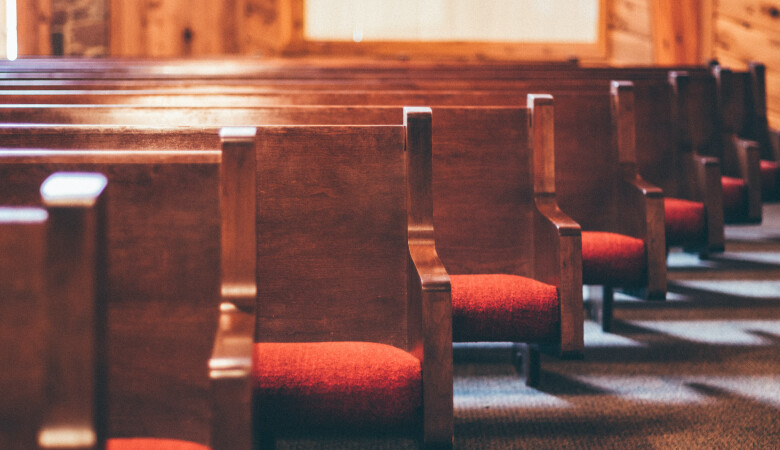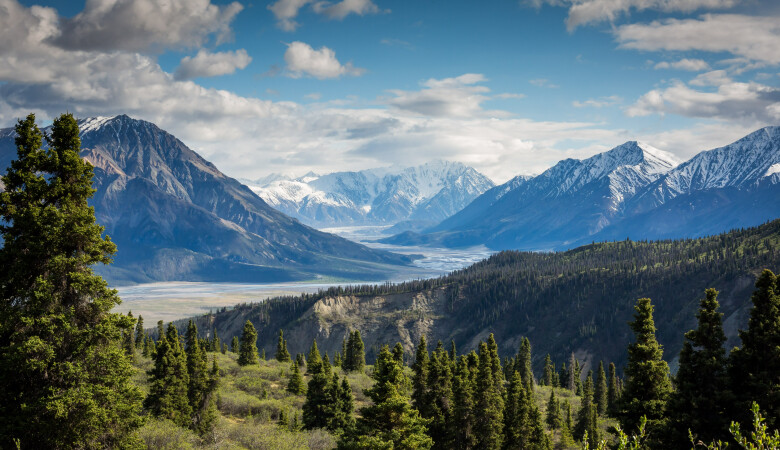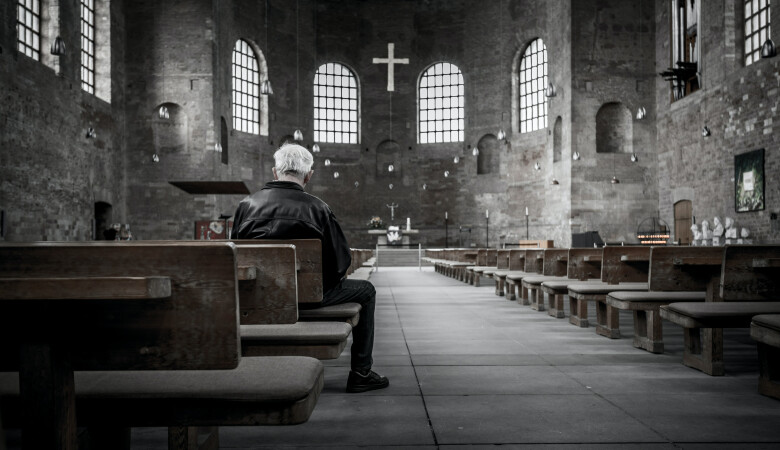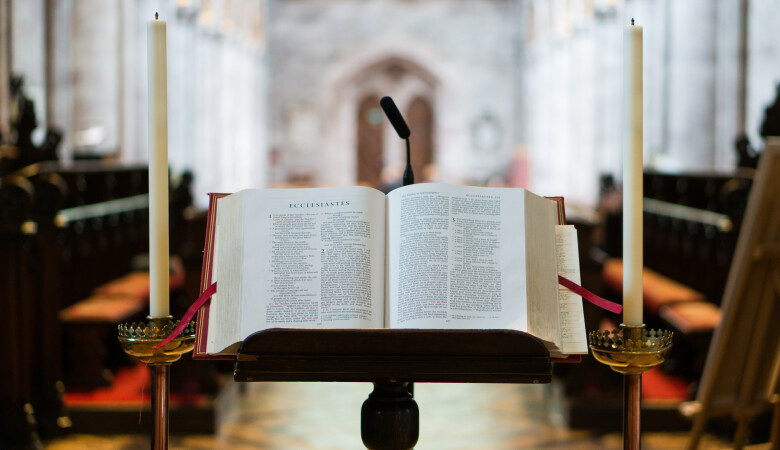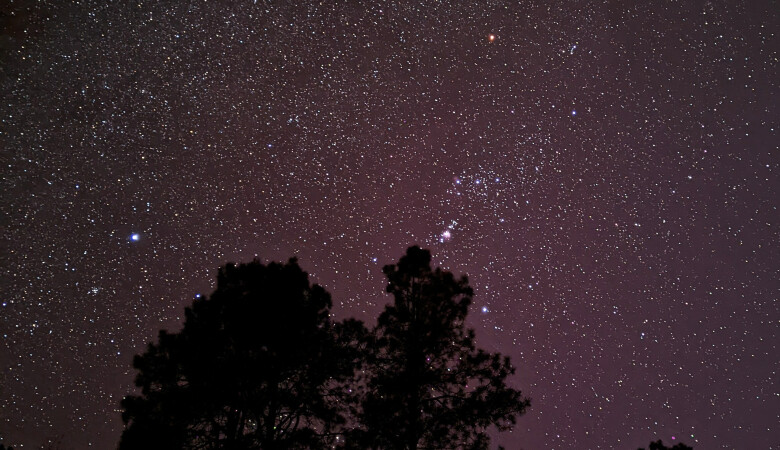Isaiah 1-66
April 06, 2003 | Andy Davis
Isaiah 1:1-66:24
Book Overviews, The Kingdom of Christ
An overview of the Book of Isaiah and the scope of the Kingdom of Christ that extends to the end of the world and the end of the ages.
- SERMON TRANSCRIPT -
I hope you've all gotten one of these green sheets, the ones at the bottom of the pile of white, and we haven't gotten there yet, so they're all green, if you need one, we've got some up at the front and you'll want them, you'll also want your Bibles, we're gonna be looking through the book of Isaiah. I did not put all the quotes in the green sheet, we're gonna have to follow along. Ordinarily, I'm going through the book of Exodus, and I hate to digress, but I just felt compelled, I was just so excited by this study that I did earlier. I was challenged recently as I was preparing for a talk that I'm gonna give to some ministers tomorrow, about the role of the word of God in the ongoing devotional life and healthy spiritual life of a pastor. By the example, I had forgotten, but of the example of George Muller, who read through the Bible 100 times in his life. Now, you may not think that's any big deal, but have you ever tried to read through the Bible once in a year? And he went, read through it 100 times, so that's on average, about twice a year for him, and maybe a little faster. That's incredible. And just the scope, what that does for you, you see, in-depth memorization of Scripture, memorizing whole books of the Bible gives you knowledge and depth, you take one book and you study it carefully and you go as deeply as you want with that one book. Reading through the Bible in a year or reading through it 100 times gives you the overall breadth, the scope of what God is doing, and you just keep learning new things, so I thought, "Well, I'll see if I can combine it,” and I've really never been able to do that before, is read through the Bible in a year and memorize books of the Bible, it's really hard to do, but I thought I'll keep going until I just can't do it anymore. And so I was going through Genesis again and some things started to click into place, and it started with the passage in Isaiah 42, which I preached on this morning.
Now, you see in your outline there, this morning's quote from Matthew 12. In Matthew it reads, "Here is my servant, whom I have chosen, the one I love, in whom I delight, I'll put my Spirit on him and he will proclaim justice to the nations. He will not quarrel or cry out, no one will hear his voice in the streets. A bruised reed, he will not break, and a smoldering wick, he will not snuff out, until he leads justice to victory. In his name, the nations will put their hope." Now, in the Isaiah passage, if you look, especially at verse 4, you see a difference, he says there, “He will not falter or be discouraged till he establishes justice on earth.” And then it says, “In his law the islands will put their hope.” It's kind of interesting, isn't it? Matthew brings it over as nations, and really the scope, and it ends up about the same, but there's a detail or a specific understanding of islands in the book of Isaiah, I spent about a year and four months doing scripture memorization in Isaiah, and I'll tell you what, the things that are there, in the book of Isaiah, it's like I've likened it before to the new world, when Columbus landed, or when Lewis and Clark went across on their expedition, there's so much to learn in the book of Isaiah, so many details. And you could take one theme, like I've done here, this is really just a word study on the word island, in Isaiah, and you would see the riches there. But that's what we're gonna do this evening. “In his law,” it says, “the islands will put their hope.”
Now, Isaiah, if you look at Isaiah 1:1, it's there on your sheet, or you can turn in your Bibles to Isaiah 1:1, either way is fine. But it says, “The vision concerning Judah and Jerusalem that Isaiah, son of Amoz, saw during the reigns of Uzziah, Jotham, Ahaz, and Hezekiah, kings of Judah.” Now, this is important, in two senses, number one, that Isaiah is, I think of all the prophets, all the Old Testament prophets, the most visionary, by far, what I mean by that is, you could close your eyes, and listen to someone reading Isaiah and streams of visions, would come into your mind, pictures really. He was a very picturesque writer, you know, you're gonna see images of streams in the wasteland, of the desert blooming with crocuses, you're gonna see the shadow of a great rock in a dry and thirsty land, a voice crying in the wilderness, for example, or you're going to see great, mighty tall sailing ships with tall masts being toppled over, an image of the humiliation of human arrogance and pride, there's lots of images that come in, one of them in chapter one is the daughter of Zion is left like a shelter in a vineyard, like a hut in a field of melons, like a city under siege. You can imagine a melon field, and so it's just flat and there are vines everywhere and there's a hut, perhaps a shelter to rest in the middle of the field, and so you can imagine the starkness of that, there's this hut, sitting all by itself, and then just a field all around it with nothing else there, and that's Jerusalem when the Assyrians came in and conquered everything but that one city, Jerusalem, and there was nothing left, and so Jerusalem was left alone, isolated like a hut in a field of melons, like a city under siege. So you see the images there, or at the end, “You will be like an oak with fading leaves, like a garden without water, the mighty man will become tinder and his work a spark, both will burn together with no one to quench the fire.” Speaking of idolatrous Israel and their works being really like drying leaves ready to burn and crackle with a fire, and that fire is coming, so they're images. It's a visionary book, and one of the images he gives us again and again is this image of the kingdom of Christ, the overall glory of the kingdom of Christ, and he gives that probably most clearly, I think in Isaiah 9, very familiar to us. Verse 6-7, "To us, a child is born, to us, a son is given, and the government will be on his shoulders, and he will be called Wonderful Counselor, Mighty God, Everlasting Father, Prince of Peace. Of the increase of his government and peace, there will be no end.” And here it is, it says, “He will reign on David's throne, and over his kingdom.” You see that, now, the kingdom image for Christ and the Messiah is not strong in Isaiah, but here it is clearly taught, that the coming Messiah, the descendant of David, “will reign on David's throne and over his kingdom, establishing and upholding it with justice and righteousness,” it says, “from that time on and forever, the zeal of the Lord Almighty will accomplish this.” Accomplish what? Well the kingdom of Christ, from the time he comes, from that point on, the kingdom will reign and it will grow and get stronger. And so that's what we have in mind, the increasing glory and the eternal glory of the kingdom of Christ, and Isaiah gives us the scope of that vision, the geographical scope is what we're really kind of looking at tonight, to the ends of the earth or to the distant islands, will be his reign. We're gonna talk about that. The ethnic scope, it includes the Gentiles, the strongest verses on God's saving intentions to the Gentiles in the Old Testament are found in the Book of Isaiah. And we're gonna look at some of them tonight. The nations, he has in mind, the nations, and also the timeframe, he's going to go from that time on and forever, right to the end of the world. So we have the scope here of Christ's Kingdom, to the ends of the earth and to the end of the age. That is the scope of Christ's kingdom.
"To the ends of the earth and to the end of the age; that is the scope of Christ's kingdom."
Now, the roots of this are the beginning, namely the original creation mandate. In Genesis chapter 1, God after creating man, male and female, in his image and after his likeness, gave them this commission. “God blessed them and said to them, ‘Be fruitful and increase in number, fill the earth and subdue it.’” Now, what does that mean, “Fill the earth?” It means, “Replicate, have more of yourselves, have lots of children who are also created in the image of God, and then just be there, be all over the world, everywhere that I've made, live there, and see what I've made.” The glorious creation, and be there as worshippers of God, those that take in the glory of God, that see it, that admire it, and that reflect it back up to him in knowing worship, something nothing else in creation can do, that's something we alone can do, we who have been taken from the Earth, physically, created out of the dust of the earth. We can stand on the ground and we can look around us and say, "This is my Father's world, God made this, and he's glorious, and he's majestic." That was our job. And so God intended, I believe, from the beginning, that the earth would be filled with the knowledge of the glory of the Lord as the waters cover the sea, and that we would do that, that we would have children and grandchildren, Adam and Eve would, and they would fill the earth with the knowledge of his glory, and that all over the world his image would be there, standing on this spot, or on that spot, or on this hill, or that mountain, we would be there all over the world, and we would see what God has made and we would honor him and we would give him glory and praise, for he made it.
But sin ruined everything, didn't it? In one sense, sin interfered, sin stepped in and made us selfish and made us wicked so we could not see his glory, we became blinded because of sin, we were cast out of the garden of Eden. Genesis 3:23, "The Lord God banished him from the garden of Eden to work the ground from which he had been taken." So we had to wrestle with the dust and with the thorns to make a living, and so everything changed when sin entered, we changed and our task changed.
And so we see at this point, the idea of scattering coming in. Now this is very interesting, so I've only begun to have these thoughts over the last two days, so this is very undeveloped for me, but the idea I have here is that God still wants the world filled, even sinners that we are. And so what he's gonna do is he's gonna scatter people all over the earth. He's gonna spread them everywhere, even though they don't know him or acknowledge him, they're going to be there, but they're not going to acknowledge him. Then he's gonna go get them, with the gospel. That's the kind of the big picture here. He's gonna send them out there, they're gonna be there, and then the gospel is gonna come after them and transform them into worshippers of God. You see what's gonna happen. So that's his second plan, and obviously he knew that the fall would happen, I'm not getting into that, but the idea is he would scatter them to the ends of the earth, and they would populate those places, and then he'd come after them with the gospel.
Cain was the first who was scattered, if you look at his situation, that he murdered his brother, over worship really, and it says "The Lord said, 'What have you done? Listen to your brother's blood cries out to me from the ground, now you are under a curse and driven from the ground which opened its mouth to receive your brother's blood from your hand, when you work the ground, it will no longer yield its crops for you,'" and then it says, "You will be a restless wanderer on earth." That's very important, isn't it? Who does that remind you of, a restless wanderer on earth? Isn't that the devil's role? You're very demonic, at this point; he's a restless roamer over the surface of the earth, that's what Cain would be like. But that's a sense of the scattering, he's gonna go out and move out at that point, and he's gonna have cities and he will, and his descendants will as well, and they're going to set up cities and they will populate them. We see the same thing happening after the flood, Noah's flood, in Genesis 9:18-19, “The sons of Noah who came out of the ark were Shem, Ham, and Japheth, Ham was the father of Canaan. These were the three sons of Noah, and from them came the people who were scattered over the earth.” do you see that? That's very interesting, Genesis 9:19, from these three sons of Noah came the peoples who are what? Scattered over the earth. What is he doing? He's spreading people all over the world, scattering them.
Now, when did that happen? Well, in Genesis 11 it happened with the incident of the Tower of Babel, you remember that story? And they had the technology, they developed a technology on how to build bricks and bake them thoroughly, and when I preached on Genesis, you remember in Genesis 11, I talked about that, why is that important? Well, it had greater compressive strength, you see, as an engineer, I can stand here and tell it, and when you bake them thoroughly, and all the moisture gets out and you can stack one on top of the other, and when you can do that, you can build tall towers and great cities at that point. And so at this point, we look in and we see what is their motive? And in Genesis 11:4, it gives the motive, “Then they said, ‘Come, let us build ourselves a city, with a tower that reaches to the heavens, so that we may [number one] make a name for ourselves and [number two] not be scattered over the face of the earth.’" They're doubly thwarting the plan of God. Do you see that? They're not going to be spread or scattered all over the Earth, they don't want that, they wanna come together and be in this one place, and why, so that they could glorify themselves; make a name for themselves. And so in this way, it's frustrating the plan of God, who would have them fill the Earth with the knowledge of the glory of the Lord as the waters cover the sea. Exactly the opposite, of what he intended, and then in Genesis 11:8-9, “So the Lord scattered them from there all over the earth and they stopped building the city, that's why it was called Babel, because there the Lord confused the language of the whole world, and from there, the Lord scattered them over the face of the whole earth.” that's twice now, in two verses and three times, in this account, in Genesis 11, this idea of scattering, the people are being scattered all over the Earth. God did it. It's not an accident. He intended it to be done. He scattered the people. Where did they go? Well, Acts 17:26 tells us where they went. What does it say? It says, "From one man, he made every nation of men that they should inhabit the whole Earth." What does the word, that, mean in that sentence? God intended that people be all over the earth, he intended that. “From one man, he made every nation of men that they should inhabit the whole earth, and he determined the time set for them and the exact places where they should live.” So where did they go? They went where God determined that they should go, they spread out, and they took their place on the earth where God intended.
Alright, well, the descendants of Japheth were particularly interesting to me as I went through the table of nations, “The sons of Japheth were Gomer, Magog, Madai, Javan, and Tubal and Meshech and Tiras, and the sons of Javan were Elishah, and then Tarshish, it says, Kittim and Rodanim,” now, Tarshish and Kittim are particularly interesting to me, but I'm gonna keep reading, “From these the maritime peoples spread out into their territories by their clans within their nations, each with its own language.” These were the maritime peoples, what does that mean? They got into ships and sailed to places you couldn't reach except by ships. Well, how do they know how to do that? Well, Noah built an ark, a very impressive ship, I must say, and so it wouldn't be so shocking for his descendants, a few generations later to know enough to build sailing vessels that could take them anywhere on the surface of the earth, they could go anywhere. And so they did. And so they peopled, among other places, the islands, the distant islands, and there would be people there, and they would have their own culture, and their own language, it says.
Now, Tarshish is the most distant populated colony of the Mediterranean Sea, perhaps as far as Spain. You remember Tarshish, in that Jonah tried to flee there from the presence of the Lord. Well, the problem was that he hadn't read Psalm 139, “Where can I go from your Spirit? Where can I flee from your presence?” “If I go to Tarshish, you are there. It doesn't matter where I go, you're there,” but he thought he would flee from the presence of the Lord. Was he going as a missionary? No, it's more of that scattering. He's just going. He wants to get away. It has nothing to do with being a missionary; it has to do with just running away from the presence of the Lord. Well, God didn't intend that Jonah go to Tarshish at that point, he said, no. Alright, now, Kittim is the general term for the islands of the Mediterranean Sea, but especially Cyprus, I think, in particular Cyprus, that's gonna play in later, again, when we see the fulfillment of the islands, I'm just setting the table right now, say, “Well, when are we gonna eat the course?” I don't know, but we're getting there, we're getting there. Okay. So the descendants of Japheth peopled the islands of the sea.
Now, Israel was called out. You know after that, shortly after the Tower of Babel, God called a man, Abraham, from Ur of the Chaldees and set his love on him and made a covenant with him, that through his offspring, all peoples on earth would be blessed, right? And so God would bless the whole world, all nations on earth blessed through Abraham, and he was the father of the Jews, the Jewish nation. And so he made a covenant with him and that they would have the Promised Land, but it wouldn't be until after the events of Exodus that we're studying, when God would lead them out with a mighty hand, outstretched arm, into the Promised Land, and they would take that Promised Land, but with a conditional covenant. What do I mean by conditional covenant? Well, there are unconditional covenants, like the covenant that God made with Noah after the ark, he said, "Look at the Rainbow. There's the sign, I'm never gonna do this again." Okay, That's unconditional covenant. God makes it, that's it. We don't need to agree or disagree, obey or disobey, he's just not gonna flood the earth anymore, like he did that one time, that's what, a uni-directional covenant. Okay, but this one, when they entered the Promised Land was not like that. It was a conditional covenant that if they disobeyed, he would do what? He would scatter them. He would kick them out of the Promised Land and scatter them to the four winds. And so it says, in Deuteronomy 4:25-31, "After you have had children and grandchildren and have lived in the land a long time, if you then become corrupt and make any kind of idol doing evil in the eyes of the Lord your God and provoking him to anger, I call heaven and earth as witnesses against you this day that you will quickly perish from the land that you are crossing the Jordan to possess, you will not live there long, but will certainly be destroyed." And here in Verse 27, "The Lord will scatter you among the peoples... " See that, kind of hard to miss, I put it in bold, underlined. But there it is, “the Lord will scatter you among the peoples, and only a few of you will survive among the nations to which the Lord will drive you. There you'll worship man-made Gods of wood and stone, which cannot see or hear, eat or smell, but if from there you seek the Lord your God, you will find him if you look for him with all of your heart and with all your soul. And when you're in distress and all these things have happened to you, then in later days, you will return to the Lord your God and obey him." Very big theme in the book of Isaiah, namely the re-gathering of Israel back to worship in the Lord and back to the promised land, very big theme, if from there, you turn, he will bring back... Now, we're studying this in Sunday school, aren't we? With the books we've been doing recently with Haggai and Zechariah and all these, but that was just a token, you have to understand that. You have to understand that's just the first fruits, that was not the ultimate, I think, re-gathering, that's prophesied in Isaiah, and others might disagree, but I think that the scope is so huge in the book of Isaiah that there's something else yet to come, and I'm excited about that. It's remarkable because, I'm just tipping my cards right here, you know who's gonna be bringing them back? It's the Gentiles who're gonna bring the Jews back. They're already out there, they're gonna hear the gospel, they'll believe it, and they'll carry the Jews back to the Promised Land. It's a remarkable thing, and Isaiah gives us the whole vision, but he says, "I'm gonna scatter you," and he did, didn't he? Song of Moses predicted all of it, they did rebel, they did become idolatrous, and he did scatter them, to the four winds, it was called the diaspora. And they were spread everywhere. The Jews went everywhere, and yet remarkably, they maintained their Jewish identity, in all the communities they went, whether it was Russia, or Greece, or Rome or whatever, they continue to be Jews, which is very interesting how God maintained that identity, and yet they're rejecting Christ, fascinating thing, but he scatters them out.
Now, Christ comes, in the fullness of time, at the right time, he enters in the world, and one of the things he's here to do, I would say one of the ways he's here, that one of the ways we speak of his mission is that he is here to re-gather. And we're gonna get to this shortly, in Matthew 12, if you look down on the third quote there, Matthew 12:30, Jesus said, “He who is not with me is against me, and whoever does not gather with me... " Does what? “Scatters.” So you're either, in one of two categories, you're either a gatherer or a scatterer. That's it. “Well, I like a third category. Some grey area. I mean, isn't it possible for me to be kind of an in-between? Kind of a semi-gatherer?” No, you're either a gatherer or a scatterer according to Jesus. Okay? Jesus came to gather. Well, what did he come to gather? Well, look at that verse in Isaiah 11:12, we'll get to that in a minute, but it's so fantastic, “He will raise a banner for the nations and gather the exiles of Israel. He will assemble the scattered peoples of Judah from the four quarters of the earth.” Isn't that fantastic? He's gonna raise up a banner and say, “Here I am, I'm the Messiah!” and they're gonna come, from the four quarters of the earth, they're gonna worship Christ. Or in Matthew 3:12, “His winnowing fork is in his hand, and he will clear his threshing floor, gathering up his wheat into the barn but burning up the chaff with unquenchable fire.” What is he gathering? His wheat, just another image of the same thing: his people. Or then in Matthew 24:31, this is at the end of the age, “He will send out his angels with a loud trumpet call, and they will gather his elect, from the four winds, from one end of the heavens to the other.” Well, that's a big gathering, and you don't wanna miss that one, folks. Okay, don't miss that one. That's the final gathering, when the angels come. So through faith in Christ, he'll come and get you and he will gather you. But you see the gathering going on, he's bringing them back together, not only Jews are gathered, but Jesus has, according to John 10:16, other sheep as well. And you remember that passage? John 10:16, “I have other sheep that are not of the sheep pen, I must bring them also. They too will listen to my voice, and there shall be one flock and one shepherd.” Isn't that fantastic? He said, “I've got sheep out there, I've got people that are mine, my chosen ones,” his elect, it says in Matthew 24:31, “but they're mine, I'm gonna go get them. They're not of this pen, but they will come and there will be one flock and one shepherd.” He has broken down the dividing wall of hostility between Jew and Gentile, there's one new man, believer in Christ, that's all, and so he's gonna gather them together into one flock, the gathering is only spiritual at this time, not physical. People stay where they are, and know God, aren't you glad? You don't have to go to Jerusalem like the Muslims go to Mecca? It would get really crowded if all Christians went physically to Jerusalem. And I'm so glad we don't have to do that. Now, the Jews did. You remember that? Physically, three times a year, they had to go up to Jerusalem. We don't need to do that. Jesus said so in John 4, “Woman, believe me, the time is coming when neither on this mountain nor in Jerusalem will you worship the Father. God is spirit, and those who worship him must worship in spirit and in truth.” What is he saying? You don't need to change your location. Not at all, God must change your heart, and if God changes your heart, you will be a spirit-filled knowledgeable worshipper of God, right where you are. And guess what, when that happens, what's gonna happen? The Earth will be a little more filled with the knowledge of the glory of the Lord because you are converted, you are transformed, and you'll just look at everything differently.
"He has broken down the dividing wall of hostility between Jew and Gentile, there's one new man, believer in Christ, that's all, and so he's gonna gather them together into one flock."
What do you mean everything? Well, the other day I was driving to a friend of mine's house, and as I was driving I noticed a turtle on the road, I don't know if they're out these days, 'cause I've seen three in the last two days. Now, I am not a tree hugger, okay? But I just felt a stewardship responsibility to pull over and move that turtle to the side of the road, and it was actually one of my more spiritual moments in the last several days, it was like an act of worship, "God, you made this turtle, I would hate to see it crushed." And so I picked it up and I moved it to the side, and I said, "Go on your way, off you go, whatever it is you do, you know? Go be a turtle somewhere, but just don't get crushed, this is not a good place for a turtle." And so I felt a sense of the glory of God in that turtle, and the Lord made it. And so that's it. I think the thing is, when the Lord transforms your heart, you see everything differently, “This is my Father's world, and we're here as stewards, we're not here to kill and to destroy, we're here to serve” like Adam was supposed to in the garden. And so there it is, we are transformed and right where we are, we can worship God, who is spirit and truth. But yet there is in a metaphorical sense, a pilgrimage to Jerusalem, our hearts face there now, don't they? There's been a streaming of the nations with the advance of the Gospel, and so in one sense, every new Christian, wherever they are, their hearts are moving towards Zion, we're looking there for our lawgiver, Jesus to give us the law and tell us how to live. He becomes our ruler. Now ultimately, we will be gathered in the New Jerusalem and yet filling the whole earth with the knowledge of God, and this I haven't fully developed yet. That cubicle, New Jerusalem, a thousand stadia, or 10,000 and all that, that's hard to understand, there are depths here that, see, we're all in one place, and yet we're filling the new heavens and the new earth, so we'll work on that later.
Let's move on before we get too, whatever, the islands of Isaiah; let's look at the first one. Turn to Isaiah 11. Isaiah 11. And we're looking at verses 1-12. Now, my watch here says three till six, is that what you guys have? Is that? Okay, yeah? Okay, alright, now that's good, that's right, I appreciate that. Why are you laughing?
Okay, alright. I don't know how we started so early to... And I'm grateful for it though; I think we did well starting at five and getting going, so I'm excited. Alright, Isaiah 11, it says, "A shoot will come up from the stump of Jesse; from his roots a Branch will bear fruit. The Spirit of the Lord will rest on him- the Spirit of wisdom and understanding- the Spirit of counsel and power- the Spirit of knowledge and of the fear of the Lord- and he will delight in the fear of the Lord." Who is this? This is our Messiah, the anointed one. This is Christ, the shoot from the stump of Jesse coming up. “He will not judge by what he sees with his eyes or decide by what he hears with his ears; but with righteousness he will judge the needy. With justice he will give decisions for the poor of the earth.” He's a king. This is what he does, he rules; he reigns. “He will strike the Earth with the rod of his mouth, and with the breath of his lips, he will slay the wicked.” He's a righteous ruler.
Righteousness will be his belt and faithfulness his sash around his waist. The wolf will live with the lamb, the leopard will lie down with the goat, the calf and the lion and the yearling together, and a little child will lead them. The cow will feed with the bear, their young will lie down together and the lion will eat straw like the ox. The infant will play near the hole of the cobra, and the young child put his hand into the viper's nest. They will neither harm nor destroy on all my holy mountain, for the earth will be full of the knowledge of the Lord as the waters cover the sea.
Isn't that marvelous? What a prophecy. “In that day, the root of Jesse will stand as a banner for the Gentiles;” or the peoples, “the nations will rally to him, and his place of rest will be glorious.” So he's gonna stand up there and everybody's gonna rally to him, and it's gonna be a glorious place of rest. Look at verse 11, “In that day the Lord will reach out his hand a second time to reclaim,” one could also say, re-gather, “the remnant of his people that is left from Assyria, from lower Egypt, from upper Egypt, from Cush, from Elam, from Babylonia, from Hamath, and from the islands of the sea.” Wow, they've gone a long way, haven't they? Yes, he's gonna reach out and he's gonna reclaim them, he's gonna bring them back, “He will raise a banner for the nations and gather the exiles of Israel. He will assemble the scattered people of Judah from the four quarters of the earth. And so the root of Jesse will come and establish his kingdom, the remnant of Israel, and God's chosen people from the Gentiles will be gathered from the distant corners of the earth.”
Second, Isaiah 24:15, turn there if you would. Now, Isaiah 24 is a picture of judgment. The Lord's devastation of the whole Earth, “See, the Lord is going to lay waste to the earth and devastate it, he will ruin its face and scatter its inhabitants, it will be the same for priest as for people, for master as for servant, for mistress as for maid, for seller as for buyer, for borrower as for lender, for debtor as for creditor, the earth will be completely laid waste and totally plundered. The Lord has spoken this word.” and brothers and sisters, this is gonna happen. 2 Peter 3 talks about it, how everything is going to be destroyed in the fire, it's all gonna go.
The earth dries up and withers, the world languishes and withers, the exalted of the earth languish. The earth is defiled by its people, they have disobeyed the laws, violated the statutes and broken the everlasting covenant, and therefore a curse consumes the Earth, and its people must bear their guilt, therefore earth's inhabitants are burned up and very few are left. The new wine dries up, the vine withers, all the merrymakers groan, the gaiety of the tambourines is stilled, the noise of the revelers has stopped, the joyful harp is silent, no longer do they drink wine with a song, the beer is bitter to its drinkers. The ruined city lies desolate; the entrance to every house is barred. In the streets they all cry for wine; all joy turns to gloom, all gaiety is banished from the earth. The city is left in ruins, its gate is battered to pieces. So will it be on the earth and among the nations, as when an olive tree is beaten, or as when gleanings are left after the grape harvest. They raise their voices, they shout for joy; from the west they acclaim the Lord's majesty. Therefore in the east give glory to the Lord; exalt the name of the Lord, the God of Israel, [Where?] in the islands of the sea.
What's going on? There's this huge devastation, and yet there's celebration right in the middle. These are the people who love God; these are the worshippers of the Lord, and where are they? Well, first of all, there are as far as in the east and the islands of the sea, verse 16, “From the ends of the earth, we hear singing: ‘Glory to the righteous one.’” Stop there. What's going on? The ends of the Earth, the distant islands are praising the God of Israel, they're worshipping. They're giving honor to him. That includes us; I would think we'd be kind of like ends of the earth to Jerusalem. Durham, North Carolina. Where is that? If you had asked Isaiah and said, "We live in Durham, North Carolina." "Oh, that's the ends of the earth as far as I'm concerned." They're singing to God. Wow.
Next, Isaiah 40:15. I'm actually gonna begin at verse 12, verse 11, sorry, “He tends flock like a shepherd and gathers his lambs in his arms,” isn't that wonderful? He's gathering them. “He who is not with me is against me, and whoever does not gather with me, scatters.” He's gathering, gathering people together. “He gathers the lambs in his arms and carries them close to his heart. He gently leads those that have young. Who has measured the waters in the hollow of his hand or with the breadth of his hand marked off the heavens? Who has held the dust of the earth in a basket, or weighed the mountains on the scales or the hills in a balance? Who has understood the mind of the Lord or instructed him as his counselor? Whom did the Lord consult to enlighten him and who taught him the right way? Who was it that taught him knowledge or showed him understanding?” Now look; verse 15, “Surely the nations, are like a drop in a bucket, they're regarded as dust on the scales, he weighs the islands as though they were fine dust.” Isn't that remarkable? We'll just stop there. The basic idea here is clear. The nations are as nothing to him. He's immense, he's powerful, and he takes these distant islands and weighs them like they're dust on the scales. They're just small, compared to his immense power.
Look at the next one, Isaiah 41, next page, verse 1-9. This is what he says, “Be silent before me, you islands! Let the nations renew their strength! Let them come forward and speak; let us meet together at the place of judgment. Who has stirred up one from the east, calling him in righteousness to his service? He hands nations over to him and subdues kings before him. He turns them to dust with his sword, to wind-blown chaff with his bow. He pursues them and moves on unscathed, by a path his feet have not traveled before. Who has done this and carried it through, calling forth the generations from the beginning? I, the Lord- with the first of them and with the last- I am he” The islands have seen it and fear; the ends of the earth tremble. They approached and come forward; each helps the other and says to his brother, “Be strong!” The craftsman encourages the goldsmith, and he who smooths with the hammer spurs on him who strikes the anvil. He says to the welding, “It is good.” he nails down the idol so that it will not topple. “But you, O Israel, my servant, Jacob, whom I have chosen, you descendants of Abraham, my friend, I took you from the ends of the earth, from its farthest corners I called you. I said, ‘You are my servant’; I have chosen you and have not rejected you. So do not fear, for I am with you; do not be dismayed, for I am your God.”
What is this teaching? Well, the distant islands are guilty of idolatry, most of them are idolaters, they're idol worshipers, and so they set up an idol, so it won't topple, they nail it down, and they encourage one another, but they're trembling in fear, why? Because God sends forth judgment, first of all, their own hearts condemn them, that their idolatry is wicked. But secondly, events happen. One from the east comes, who is this, well there's different interpretations, but I think it's a military conqueror, it could be like Cyrus who comes and he gives over the lands, the islands into their hands, and so there are under the sway of the rise and fall of history and of empires that rise and fall, and they're always afraid, they're idolaters, the ends of the earth, the islands. Let's not think of the islands of the earth as though they're the noble savage, who don't need the Lord, oh they're idolaters and they're wicked, and they're under the judgment of God if they won't repent, but God's gonna bring them the gospel, isn't that wonderful? They're gonna see the light, and they're going to believe.
Look at the next one, Isaiah 42:1-12, this will sound familiar, I hope., Here is my servant, whom I uphold, my chosen one in whom I delight, I will put my Spirit on him and he will bring justice to the nations. He will not shout or cry out, or raise his voice in the streets. A bruised reed, he will not break, and a smoldering wick, he will not snuff out. In faithfulness he will bring forth justice; he will not falter or be discouraged till he establishes justice on earth. In his law the islands will put their hope.
Stop there for a moment. Who are we talking about? Well, this is Jesus Christ, he's going to come, the servant of the Lord, and he's gonna establish his kingdom, and in his sovereign reign, in his law, the islands will hope. They'll find their hope. They will trust in him. Now, it's interesting, Matthew translates it, "in his name the islands will put their trust or their hope." But is there really a distinction between law and name? “Open up in the name of the king.” It's the same thing, right? And so the king, with his name and with his authority and with his law will come and the islanders are going to accept, they're going to yield. They'll submit to the king of the kingdom of heaven, Jesus Christ. Continue reading, verse 5, “This is what God the Lord says- he who created the heavens and stretched them out, who spread out the earth and all that comes out of it, who gives breath to its people and life to those who walk on it”. Verse 5 says, “I made them, I made the islanders. I created them. I formed them in their mother's womb.” Verse 6,
“I the Lord have called you in righteousness, I will take hold of your hand. I will keep you and make you to be a covenant for the people and a light for the Gentiles, to open eyes that are blind, and free captives from prison, to release from the dungeon those who sit in darkness. I am the Lord; that is my name! I will not give my glory to another or my praise to idols. See, the former things have taken place and new things I declare; before they spring into being, I announce them to you.”
Verse 10, “Sing to the Lord a new song, his praise from the ends of the earth. You who go down to the sea and all that is in it, you islands and all who live in them. Let the desert and its towns raise their voices; let the settlements where Kedar lives rejoice. Let the people of Sela sing for joy; let them shout from the mountaintops. Let them give glory to the Lord and proclaim his praise in the islands.” Isn't that wonderful? Let them praise and exalt God in the distant-most reaches of the earth. Will they? Is this a prophecy, a prediction? Is this actually going to occur? Oh yes, it will. I'm telling you it has. It's already happened. It's not done yet, but it's already happened, it's already occurred. Even over the last century and a half, these prophecies are being fulfilled right in our own time.
But they're very specific, aren't they? Look at Isaiah 49:1, "Listen to me," it says, "You islands; hear this, you distant nations," by the way, who's writing this? This is Isaiah. Where is he? He's probably living in Jerusalem. When? Seventh century BC, and he's writing down on a piece of scroll or parchment or something like that, "Listen to me, you islands." Now what are the odds, humanly speaking, that they'll ever hear anything he says? The answer is zero, humanly speaking. What are the odds, divinely speaking, that they will read this and hear it and believe it? 100%. And so he's speaking to them, he's addressing them, "Hear, O Heavens and Listen, O Earth for the Lord has spoken." He says, "Isaiah, just write this down. Let me take care of the delivery. I'll get it there, you just write it down." Okay, alright, Isaiah, what do you say? "Listen to me, you islands; hear this, you distant nations." Now he is speaking as a prophet, and he's speaking Christ's words here. Isn't he? Listen.
Before I was born, the Lord called me; from my birth he has made mention of my name. He made my mouth like a sharpened sword, in the shadow of his hand he hid me; he made me into a polished arrow and concealed me in his quiver. He said to me, “You are my servant, Israel, in whom I will display my splendor.” [Verse 4] But I said, “I have labored to no purpose; I've spent my strength in vain and for nothing. Yet what is due me is in the Lord's hand, and my reward is with my God.” And now the Lord says- he who formed me in the womb to be his servant to bring back Jacob to him and gather Israel to himself, for I am honored in the eyes of the Lord and my God has been my strength- [I love verse 6] he says: "It is too small a thing for you to be my servant to restore the tribes of Jacob and bring back those of Israel I have kept. I will also make you a light for the Gentiles, that you may bring my salvation to the ends of the earth."
Now, this has gotta be Christ. In one sense, you could say it's Isaiah who's writing it, but it's got to be Christ, because Simeon said that Christ would be a light for the Gentiles. And so Christ is the light for the Gentiles, and God, the Father has spoken to him and said, “It's too small a thing for you to save Israel only. It's too small; I will make you a light for the whole world. Even to the distant most islands of the earth.”
Isaiah 51:5, look at verse 4-6, it says, "Listen to me, my people; hear me, my nation: The law will go out from me; my justice will become a light to the nations. My righteousness draws near speedily, my salvation is on the way, and my arm will bring justice to the nations. The islands will look to me and wait and hope for my arm. Lift up your eyes to the heavens, look at the earth beneath, the heavens will vanish like smoke. The earth will wear out like a garment, and its inhabitants die like flies, but my salvation will last forever. My righteousness will never fail."
So this is a strong exhortation to the islands to trust in Christ, why? Because they're vanishing like smoke, the heavens will disappear, there'll be no place to live any longer. And so come to Christ. Now, what's interesting is in Isaiah 51:1-3, it says, "Look to the rock from which you are cut, to the quarry from which you are hewn, look to Abraham, Your Father and to Sarah, who gave you birth." This is a Jewish Messiah. And so, “Salvation,” said Jesus, “comes from the Jews,” and so all the islands, the distant lands are gonna look to a descendant of Abraham, the rock from which they were cut, they're gonna look to him and trust in him and find their salvation there.
Isaiah 59:18, now, Isaiah 59 speaks about sin. Verse 1, it says, "Surely the arm of the Lord is not too short to save, nor his ear too dull hear. But your iniquities have separated you from your God, and your sins have hidden his face from you, so that you will not hear. For your hands are stained with blood, your fingers with guilt. Your lips have spoken lies and your tongue mutters wicked things. No one calls for justice; no one pleads his case with integrity. They rely on empty arguments and speak lies; they conceive trouble and give birth to evil. They hatch the eggs of vipers and spin a spider’s webs. Whoever eats their eggs will die, and when one is broken an adder is hatched. Their cobwebs are useless for clothing; they cannot cover themselves with what they make. Their deeds are evil deeds, and acts of violence are in their hands. Their feet rush into sin, they're swift to shed innocent blood."
That's quoted from Romans 3; he quotes it there. What is this talking about? It's talking about the universality of personal sin, and when they try to cover themselves with their deeds, cloak of righteousness, you're gonna stand before God on judgment day with your cloak of righteousness, it's gonna be like covering yourself with cobwebs. Your righteousness is nothing. You've lived the life of an adder, of a snake, and so there's no righteousness to cover yourself, and that's true to the ends of the earth. Look what it says in verse 18, "According to what they have done, so will he repay wrath to his enemies and retribution to his foes; he will repay the islands their due." Do you see that? Judgment comes even to the islands, to the Jew first, and then what? To the Gentile, and that includes the islands. So they have personal sin, and if they do not repent and trust Christ, if they do not accept the gospel, then they will come under vengeance, they will come under vengeance, 'cause judgment reaches to the ends of the earth. Nobody escapes.
Isaiah 60, magnificent chapter, the glory of Zion. "Arise and shine, for your light has come and the glory of the Lord rises upon you. See darkness covers the earth and thick darkness is over the peoples, but the Lord rises upon you and his glory appears over you. Nations will come to your light and kings to the brightness of your dawn." This may be the most important chapter in our study tonight. Concentrate now on verse 4, "Lift up your eyes and look about you, all assemble and come to you, your sons come from afar and your daughters are carried on the arm. Then you will look and be radiant. Your heart will throb and swell with joy." What are we talking about here, Zion? What is Zion? Well, in one sense, it's Jerusalem, the center of Jewish worship. This nation that's been trampled by the Gentiles, stripped and ruined and the walls are cast down, what does he say here? You're gonna look good, you're gonna be dressed up and you're gonna be dazzling and glorious, You'll look and be radiant, your heart will throb and swell with joy; the wealth on the seas will be brought to you, to you the riches of nations will come. Herds of camels will cover your land, young camels of Midian and Ephah. And all from Sheba will come bearing gold and incense and proclaiming the praise of the Lord. All Kedar's flocks will be gathered to you, the rams of Nebaioth will serve you; they will be accepted as offerings on my altar and I will adorn my glorious temple. “Who are these that fly along like clouds, like doves to their nests? Surely the islands look to me; in the lead, are the ships of Tarshish, bringing your sons from afar, with their silver and gold."
Now stop there. This is fascinating. The people from the islands, Tarshish, are sailing to Zion, aren't they? And who are they bringing with them? Your sons, who are the sons? The Sons of Zion, they're Jews. And how... In what sense are they bringing them back to Zion? Well, who do you think is gonna lead the unbelieving Jews to Christ? Some Jews maybe, Jews for Jesus do that. It's mostly Gentiles though. We're the ones that make them jealous according to Paul, and we have the gospel. And who do you think in the end, when all Israel will be saved and there's a great in-gathering of Jews is gonna be, are gonna be the witnesses, the evangel, those that are taking the gospel? Is it not the inhabitants of the islands, among others, who will bring them to personal faith in Christ and bring them back home?
Why don't you read the whole chapter when you have time, we're gonna finish with Isaiah 66:18-22, turn there. And it says there, this is the new heaven and new earth, "And I, because of their actions and their imaginations, am about to come and gather all nations and tongues, and they will come and see my glory. I will set a sign among them and will send some of those who survive to the nations- to Tarshish [that's that distant island], to the Libyans and Lydians (famous as archers), to Tubal and Greece, [these are all Gentiles, by the way] and to the distant islands that have not heard of my fame or seen my glory. They will proclaim my glory among the nations. [Now listen] They will bring all your brothers, [these are Jews] from all the nations, to my holy mountain in Jerusalem as an offering to the Lord- on horses, in chariots and wagons and on mules and camels, says the Lord. “They will bring them, as the Israelites bring their grain offerings to the temple of the Lord in ceremonially clean vessels. And I will select some of them also to be priests and Levites,” says the Lord. “As the new heavens and the new earth that I make will endure before me,” declares the Lord, 'so will your name and descendants endure.'"
This is the eternal state, isn't it? And what's happening is, again, these Gentiles from the distant lands from Tarshish, from Lydia and all of these other places, are going to bring Jews back to Jerusalem to personal faith in Christ. Now, I wanna add a quick footnote on how this has been fulfilled. In Acts Chapter 13, when Paul and Barnabas went out on their first missionary journey, where did they go first? Does anybody know? They went to Cyprus; that was their first place, they left Joppa and went to Cyprus. That's Kittim, that's their first place that they preached the gospel, that's the beginning of the missionary endeavor of the church of Antioch, they go to the island of Cyprus and they begin preaching there. And then at the end of Paul's recorded life in Acts 28, he's shipwrecked and where does he end up? Malta, an island off Italy, you remember? And he gets to witness there to the governor and they come to faith in Christ because of a miracle he does there when he shakes off a snake and he heals some people there. Malta. Maybe that was even Tarshish, I don't really know what Tarshish is, just the distant islands in the Mediterranean, that's pretty distant. Paul intends to go even beyond there to Spain, and perhaps as far as what he intends in Tarshish. That's the apostle Paul.
What about in our day? Well, perhaps you've heard of John Paton, he went to the New Hebrides in the 1850s and '60s, and led them to Christ. They were cannibals. They ate the last missionary that was there, you remember the story, and the ship that had left the missionaries on the beach sat there and watched from the shore or from the distance with their telescopes as these cannibals ate them, John Paton was the next missionary at that stop.
Now, that took incredible courage, didn't it? He went there and he led them to Christ, they became an offering to the Lord and they worshipped God, and that beautiful island there that God had filled with his glory so long ago, those islanders, they knew his glory. The Earth was filled with the knowledge of the glory of the Lord as the waters cover the sea. And after World War II, when soldiers had gone island-hopping with General MacArthur, after the war was over, they said, "Hey, let's go back, let's go back as witnesses," MacArthur called for thousands of missionaries to go to Japan, we've been there, Jordan and I and others have gone to witness to that island, that counts, it's an island in the sea. And there are Christians there. And also Irian Jaya, like Don Richardson, brought those islands idol worshippers to faith in Christ.
Now, there's still work to be done, isn't there? But this is... I'm arguing from the greater to the lesser. If God cares about little dots and islands in the ocean, he cares about every square inch of this earth, and the earth will most certainly be filled with the knowledge of the glory of the Lord as the waters cover the sea.







